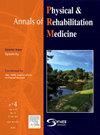虚拟现实中的模拟呼吸不影响长COVID患者身体康复期间的感知努力。
IF 4.6
3区 医学
Q1 REHABILITATION
Annals of Physical and Rehabilitation Medicine
Pub Date : 2025-01-22
DOI:10.1016/j.rehab.2024.101922
引用次数: 0
摘要
目的:评估虚拟现实(VR)中模拟呼吸对长期COVID患者在康复期间感知努力水平的影响。方法:我们在一项沉浸式VR自行车运动中进行了一项参与者内部随机前瞻性研究,在模拟呼吸的三种平衡条件下:较慢呼吸、中性呼吸和较快呼吸。本研究共纳入37名长COVID和去调节的参与者,其中36人可以完成实验。结果:研究没有显示模拟呼吸的频率对参与者感知努力的影响,这是主要的判断标准。我们没有发现模拟呼吸频率对感知疲劳、晕动病和化身(VR指标)以及偏好有任何影响。然而,在更快的模拟呼吸条件下,观察到更高的实际呼吸率。结论:本研究未显示在VR中使用模拟呼吸来操纵长COVID患者身体康复期间的感知努力的有效性。然而,我们的结果表明这种技术是可行的,因为只有一个参与者因为他们的症状而退出,因为大多数参与者对系统有很好的欣赏,并且报告感觉相当强烈的化身和轻微的晕机。本文章由计算机程序翻译,如有差异,请以英文原文为准。
Simulated breathing in virtual reality does not affect perceived effort during the physical rehabilitation of people with long COVID
Objective
To assess the effectiveness of simulated breathing in virtual reality (VR) for manipulating the level of perceived effort of people with long COVID during sessions of physical rehabilitation.
Methods
We conducted a within-participants randomized prospective study during a cycling exercise in immersive VR with three counterbalanced conditions of simulated breathing: slower breathing, neutral breathing, and faster breathing compared to theirs. 37 participants with long COVID and deconditioning were included in the study, 36 of which could finish the experiment.
Results
The study did not show any influence of the rate of the simulated breathing on participants' perceived effort, which was the primary judgment criterion. We did not find any effect of simulated breathing rate on perceived fatigue, cybersickness and embodiment (VR metrics), and preference. However, higher actual breathing rates were observed in the condition with faster simulated breathing.
Conclusion
The study did not show the effectiveness of using simulated breathing in VR to manipulate perceived effort during the physical rehabilitation of people with long COVID. Nevertheless, our results suggest that this technique is feasible, as only one participant dropped out due to their symptoms, as most participants had a good appreciation of the system, and reported feeling rather strong embodiment and weak cybersickness.
求助全文
通过发布文献求助,成功后即可免费获取论文全文。
去求助
来源期刊

Annals of Physical and Rehabilitation Medicine
Medicine-Rehabilitation
CiteScore
7.80
自引率
4.30%
发文量
136
审稿时长
34 days
期刊介绍:
Annals of Physical and Rehabilitation Medicine covers all areas of Rehabilitation and Physical Medicine; such as: methods of evaluation of motor, sensory, cognitive and visceral impairments; acute and chronic musculoskeletal disorders and pain; disabilities in adult and children ; processes of rehabilitation in orthopaedic, rhumatological, neurological, cardiovascular, pulmonary and urological diseases.
 求助内容:
求助内容: 应助结果提醒方式:
应助结果提醒方式:


